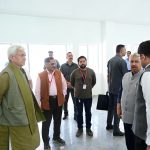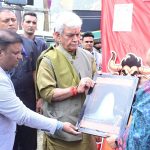New Delhi, Aug 18: Anusandhan National Research Foundation (ANRF), passed by the Parliament last week, aims at equitable funding and democratisation of resources in research and academics, said the Union Minister of State (Independent Charge) Science & Technology; MoS PMO, Personnel, Public Grievances, Pensions, Atomic Energy and Space, Dr Jitendra Singh on Friday.
Delivering a keynote address at a workshop on Capacity Building for Science and Technology here, Dr Jitendra called for more and more Private Research Foundations to be assimilated with Government Scientific Departments for Technology-led Development of India. He called for equitable funding of scientific research and bringing in greater private participation.
The minister emphasised that the ANRF envisaged by PM Narendra Modi will catapult India to the league of developed nations pioneering new research in new frontiers. “ANRF will have to nudge companies to invest in R&D. The government is planning a unique Public Private Partnership (PPP) entity for which Rs 36,000 crore of the research funding is to come from the private sector, mostly industry whereas government will put Rs 14,000 crore for the same, to ensure greater participation of industry,” he said.
Dr Singh said the pace of change is so rapid that India can’t afford to wait any longer and the time has come to end the demarcation of Public and Private. He called for a meaningful exchange of ideas between public and private labs for building a tech-led prosperous India.
He said scientists should adopt a team-driven approach to problem-solving and product development rather than an individual approach towards research. He exhorted the scientific community to pick up good things and best practices of the Corporate Sector and underlined that a threshold of absorption of capacity building must be defined.
The union minister informed that India is now launching cutting-edge technological breakthroughs in tandem with the Developed countries of the world and gave the example of the National Quantum Mission (NQM) and international laurels in the Space sector.
He said investments in AI and quantum technology would lead to transformative advances in our everyday lives and greatly benefit our social well-being by impacting healthcare, agriculture, climate change and more. He welcomed the transformative potential of the Endowment fund.
Adil Zainulbhai, Chairman, Capacity Building Commission, Prof, Ajay Sood, Principal Scientific Advisor to Government of India, Dr Rajesh Gokhale, Secretary, DBT, Praveen Pardeshi, Member (Admin) CBC and many senior Scientists and officials took part in the workshop.
The intention behind setting up the Capacity Building Commission (CBC) is to provide a strategic framework for capacity building of the ministries and departments. Capacity Building for S&T can create a pipeline of skilled researchers, scientists, and professionals who can enable India to engage more effectively in international collaborations.
Such collaborative research efforts can lead to shared knowledge, cultural exchange, and collective solutions to global problems.







